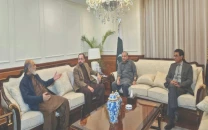Access to education: Punjab asked to remove financial barriers
Calls for introducing monitoring and accountability system to ensure better funding utilisation .

A civil society organisation has asked the Punjab government to remove financial barriers that might prevent children from acquiring the compulsory 10 years of education.
Centre for Peace and Development Initiative (CPDI) Programme Manager Raja Shoab Akbar while talking to The Express Tribune said there was a dire need to remove barriers facing underprivileged students so that they could complete their education without any hurdles.
He said that Punjab, as the most-populous province, carries special importance and any effort to improve education in the province means that more than half of country’s population will benefit from it.
Akbar said that section 2 (e) of the Punjab Free and Compulsory Education (PFCE) ordinance implied that the provincial government and the local authority will endeavour to prevent financial barriers that might prevent a child from completing 10 years of education.
He explained that the ordinance prevented imposition of any fee or other charges from a child making it the shared financial responsibility of the province and the local authority for the purpose but it did not provide any specific guidelines for the provision of adequate resources to schools.
The CPDI programme manager said that there could be three dimensions of the term financial barriers--- poverty of a child’s family, expenses incurred on the education of a child, and non-provision of adequate financial resources to educational institutions.
He said that most schools received insufficient amounts ranging from Rs20,000 to Rs50,000 under the school council fund (SCF).
Akbar said that the CPDI had recommended that variable allocations must be made by the government according to the number of students enrolled in each school.
He said that the amount should also be given to secondary schools and should replace the administrative budget exclusively given to high schools.
He said that the ordinance had also not addressed the issue of registration or other fees received by examination boards. He said that they had recommended that a clause should be added in the ordinance stating examination boards will collect the registration or examination fee or any other charges.
Akbar said that improvement of school buildings and provision of missing facilities had also not been addressed in the ordinance. He said that the CPDI had recommended that the ordinance must make it binding on the government to improve the condition of existing buildings and provide all missing facilities within a period of two years.
While talking about the situation at schools in Punjab, he said that according to a survey conducted in Jhang, 16 per cent of classrooms in different schools needed immediate repair work to avoid any mishap, 22 per cent schools did not have boundary walls, 76 per cent had no staffrooms and 86 per cent lacked student libraries, while the aggregate enrolment ratio in schools declined by two per cent in 2011-12 when compared to the previous year. He said that this was the situation of one district and a lot more was needed to be done by the government to address the situation.
Punjab Teachers’ Union (PTU) President Raja Shahid Mubarik said that the government will have to focus on schools in rural areas because they barely get attention from the authorities.
Lahore University of Management Sciences (LUMS) Associate Prof Dr Faisal Bari said that after the 18th Amendment, it has now become the responsibility of provincial governments to plug holes in the education system. He said that though the provincial governments were allocating almost 24 per cent of budget to education the condition was not improving. He said that the problem lied in lack of accountability and monitoring by the government, leading to embezzlement of funds by administrative heads. He added that the situation will remain the same until the government introduced proper monitoring and accountability system to ensure transparency. Punjab Minister for Education Rana Mashhood was not available for comments.
Published in The Express Tribune, July 27th, 2014.


















COMMENTS
Comments are moderated and generally will be posted if they are on-topic and not abusive.
For more information, please see our Comments FAQ